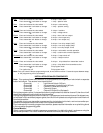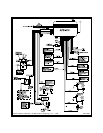
Page 3
Do not
mount the control module in the engine compartment, as it is not waterproof. You should also avoid
mounting the unit directly onto factory installed electronic components. These components may cause RF
interference, which can result in poor transmitter range or intermittent operation.
Siren:
Select a mounting location in the engine compartment that is well protected from access below the vehicle.
Avoid areas near high heat components or moving parts within the engine compartment. To prevent water
retention, the flared end of the siren must be pointed downward when mounted.
Mount the siren to the selected location using the screws and bracket provided.
Hood or Trunk Pin Switch:
A pin switch is included for use in protecting the hood or trunk ( or hatchback ) of the vehicle. The switch
must always be mounted to a grounded, metal surface of the vehicle. It is important to select a location
where water cannot flow or collect, and to avoid all drip gutters on hood and trunk fender walls. Choose
locations that are protected by rubber gaskets when the hood or trunk lid is closed.
The pin switch can be mounted using the bracket provided, or direct mounted by drilling a ¼ “ diameter
mounting hole. Keep in mind that when properly mounted, the plunger of the pin switch should depress at
least ¼ “ when the hood or trunk lid is closed.
Dash Mounted L.E.D.:
A small red L.E.D. is included that will serve as a visual indicator of the alarm status. It should be installed
in the dash, located where it can be easily seen from outside the vehicle, yet not be distracting to the driver.
Once a location has been selected, check behind the panel for wire routing access, and to confirm the drill
will not damage any existing components as it passes through the panel.
Drill a ¼ “ diameter hole, and pass the red and blue wires from the L.E.D. through the hole, from the front
of the panel. Firmly press the body of the L.E.D. into the hole until fully seated.
Valet Switch:
Select a mounting location for the switch that is easily accessible to the driver of the vehicle. The switch
does not have to be concealed, however, concealing the switch is always recommended, as this provides
an even higher level of security to the vehicle.
The valet switch can be mounted to the lower side of the dash by drilling a ¼ “ diameter hole in the selected
location.
Be sure to check behind the dash for adequate clearance for the body of the switch, and to confirm that the
drill will not damage any existing components as it passes through the dash. Route the two pin connector
toward the control module.
Shock Sensor:
Select a solid mounting surface for the shock sensor on the firewall inside the passenger compartment,
and mount the sensor using the two screws provided. The shock sensor can also be secured to any fixed
brace behind the dash using tie straps.
Whichever mounting method is selected, make certain that the sensitivity adjustment is accessible for use
later in the installation.
WIRING THE SYSTEM
Large 8 Pin Edge Connector:
Red/White (5Amp) & Red Fused (15Amp) Wires : + 12 VDC CONSTANT BATTERY SOURCE
This wire controls the sensitivity of the voltage sensing circuit, which detects the turning on of an interior
light when a door is opened. It will also detect the switching on of parking or headlamps, and in many cases
will trigger the alarm when a thermostatically controlled electronic radiator cooling fan switches on.
When installing this system into vehicles with electronic “ after fans “, it is recommended you disable the
voltage sense circuit.
In voltage sensing applications, the closer to the battery that the red wire is connected, the less sensitive
the voltage sense circuitry will be. Moving this connection point to the fuse panel will increase the sensitiv-
ity, and connecting to the courtesy lamp fuse in the vehicle will provide maximum sensitivity of the voltage
sense circuit. Be certain to set selectable feature # 7 to 1 chirp, Voltage Sense On.
When hardwiring the control module to pin switches at all entry points, the voltage sense circuit must be
disabled.










